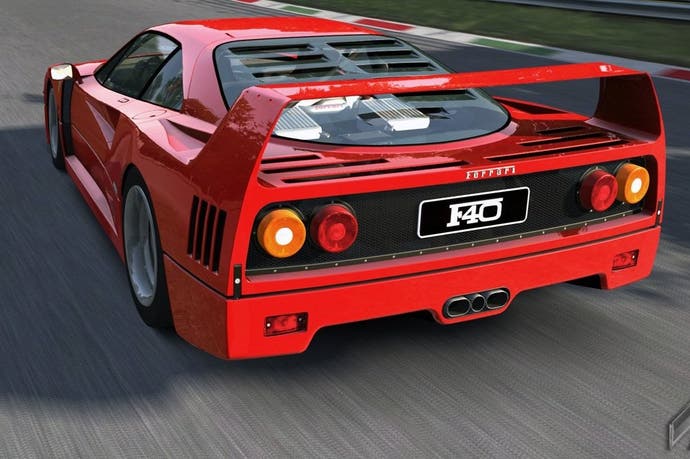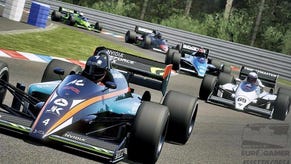Assetto Corsa console review
The lap of the gods.
The proof of any racing game is in its time trial mode. Just you, your vehicle and the track in communion; nothing to dilute or interfere with the faceted challenge of shaving seconds off your time through skill, ingenuity and courage; and nowhere for the game itself to hide. It has to be fun and interesting to drive for its own sake, or it's sunk.
Judged only on this criteria, Assetto Corsa is the best motorsport game around right now. Arriving on consoles after a successful couple of years on Steam, this release from Italian studio Kunos Simulazioni has already earned a reputation with the PC sim-racing crowd for the excellence of its handling model. Car physics simulations are a surprisingly subjective business, and everyone has their favourite, but few could find fault with the realism, detail and driveability (for want of a better word) of Assetto Corsa. It has a very persuasive weight and will punish mistakes, but it's not jittery or overly severe.
It's so tremendously mechanically articulate that each car in its garage takes on a life of its own. There is no comparison between driving a firmly-sprung, front-wheel-drive Abarth 500 Corse in racing trim - a stubby little hatchback with a punchy, blunt response - and a mid-60s moon rocket like the Lamborghini Miura, which winds up to great speed through its long gears, but needs to be threaded through corners with the utmost delicacy. It's like playing a different game.
In fact, Assetto Corsa's simulation is so good that driving a slow car isn't necessarily easier or less involving than driving a fast one. A BMW Z4 GT3 race car, for example, offers such phenomenal grip and sophisticated traction control that it's unshakeable even north of 150mph, whereas the humble Alfa Romeo GTA's weak brakes, rolling suspension and twitchy rear can make driving the Nordschleife at speeds slower than your daily commute a hair-raising thrill. (One of the game's best features is the "factory" option for traction control and ABS, which sets these assists according to their installation on the real car; this gives you the confidence that you're driving each car as its makers intended, and eliminates such silly anachronisms as driving a modern race car without traction control, or a vintage sports car with it.)
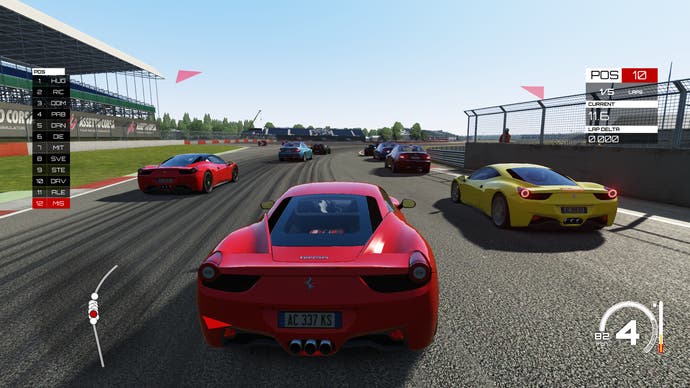
There are harder handling models to get to grips with than Assetto Corsa's, but still, only those interested in engaging with its full realism need apply. It doesn't have much in the way of assists, and those it does have, you don't want turned on. I found the stability control deadened the handling to the point of dullness. In fact, it muted the game's feel so much that it actually made it harder to drive well. I quickly knocked it all the way down to zero. Automatic gears, too, are barely useable, with painfully slow downshifts. On the plus side, though you do need a wheel to get the best of it, it handles very well on a pad - much better than Project Cars or even Gran Turismo.
For purists, then, Assetto Corsa offers a thrilling hotlap that powerfully communicates the mercurial interface of car and driver and road. Unfortunately, stripped of the mod support and the dedicated community that buoy the game on PC, this roughly presented console version rather harshly exposes its shortcomings elsewhere.
The first of these that you'll notice is a scruffy and unceremonious front end that doesn't so much as congratulate you on a race win. The game's most important failing, though, is an aimless and barely functional career mode. Starting you in slow front-wheel drive cars on unfamiliar and tricksy circuits, this ought to be your introduction to the game, but if anything it alienates you from it. The difficulty is poorly tuned - even on 'easy', racing AI is tough to beat, while the arcade-style time attack (which tops up the clock at the end of every track sector) is sometimes so easy that it never ends. Crudely structured and completely lacking in context, the career mode gives you no reason to persevere, since all cars and tracks are fully unlocked in other modes and there is no other form of progression or validation away from the track.
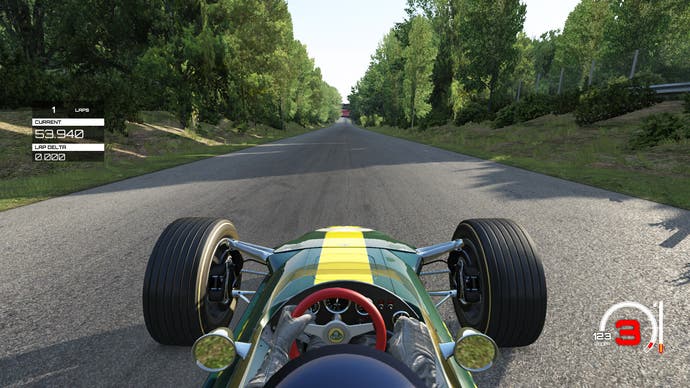
Special Events are better, offering a wide selection of curated car-and-track combinations to explore, some of which are inspired. It leans on hotlapping, but includes some drift, time attack and quick race events too. This feels like the heart of the game - but with no indication of difficulty and the events presented in seemingly random order, navigating it can be pot luck for newcomers. It's also a crying shame that there are no online leaderboards for the hotlaps, cutting the best part of the game off from its community and from your friends list.
Over in the free-form Drive section of the game, you'll find all the above event styles to set up to your liking, a decent replay viewer and editor, and a welcome "race weekend" option. The latter prepares you for the demanding races with practice and qualifying sessions, and though long-winded it's much more rewarding than Quick Race. Mysteriously, it doesn't seem to be used in the Special Events or Career at all.
Drive is also where you'll find online racing. At present this is rather basic. There are no custom match options; you just pick one from a playlist of track days, drift events and race weekends and go. That's probably for the best, since the community is currently so small it can barely support this playlist, and it doesn't need fracturing any further. I didn't experience any trouble connecting to online races, but I did find that they could suffer from a juddery frame-rate and unresponsive controls. Assetto Corsa attracts a strong community of sim racers on PC, but it's hard to see it gaining traction with the console crowd.
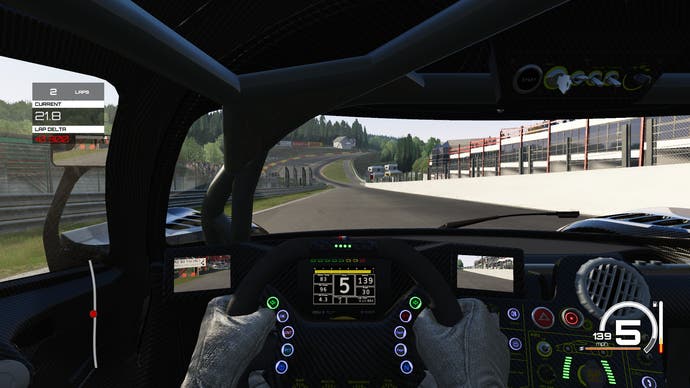
Kunos is a small studio without the resources of a Codemasters or a Slightly Mad, never mind a Polyphony Digital or Turn 10 - and this kind of game is very work-intensive to produce. So you won't find me complaining about its small selection of cars and tracks, especially when the cars possess such distinct personalities and when the sheer quality of the simulation gives all the permutations of car and track such challenging depth. The understandable local bias towards Italian marques and circuits just serves to give the game a stronger flavour.
Track-wise, the offering is small and completely Euro-centric, but has most of the continent's big beasts bar Le Mans - the Nordschleife, Spa, Silverstone and Monza, the latter even in its free-wheeling, chicane-free 1966 layout - plus some obscure Italian circuits and fan favourites like Imola and Brands Hatch. The car selection is modest, eclectic and seemingly random, with tiny motorsport manufacturers like Scuderia Glickenhaus and Tatuus sitting alongside cherry-picked classics, road cars and race cars from Ferrari, Ford and BMW. But it actually covers all bases impressively well: there are humble production hatchbacks, hybrid hypercars, retro cult favourites, contemporary GT racers and open-wheelers, vintage F1 cars, sports prototype classics and brutish touring cars.
Think of it as a tasting menu prepared by chefs who really know their ingredients, and how to make them sing. It's just frustrating that it takes another enthusiast to appreciate their work because the dishes appear in a random order, the service is perfunctory, and the restaurant is a bare room with hard chairs. Assetto Corsa is the equal of any driving sim behind the wheel. Its authenticity is beyond reproach. It's great for console owners to have access to that, but it has no answer to Project Cars' exciting career mode, Forza's slick multiplayer or Gran Turismo's compulsive metagame of collection. Perhaps it doesn't need them, but in the console game context, it does need to make it easier for players to discover and enjoy its strengths. It deserves to be more than racing fans' best-kept secret.
